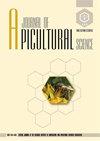Optimization of Extraction Parameters of Ethanol Extracts of Propolis Samples Using Artificial Neural Network and Moth-Flame Optimization Algorithm
IF 0.7
4区 农林科学
Q4 ENTOMOLOGY
引用次数: 0
Abstract
Abstract In this study, the optimum values of propolis ethanol extracts parameters were determined with the use of single and multi-objective optimization procedures. The euclidean distance approach was used in the multi-objective optimization process. Firstly, propolis was extracted using water with ethanol contents 40, 50, 60, 70 and 80% for 8, 10, 12, 16, 20 and 24 h. Then, total phenolic content (TPC) and ferric reducing antioxidant power (FRAP) activities of all extracts were determined. With the obtained data a prediction model was produced with the use of artificial neural networks (ANN), and optimization was performed using a moth-flame (MFO) algorithm. The best prediction models for the TPC and FRAP were observed in 2-5-1 and 2-5-1 network architecture with the mean absolute percentage error (MAPE) values, 5.126 and 2.451%, respectively. For maximum TPC, the extraction parameters were determined as ethanol content 57.5% and extraction time 13.56 h. To maximize FRAP, the optimized extraction parameters were ethanol content 72.03% and extraction time 18.04 h. The optimum extraction conditions for both maximum values of the studied assays were ethanol content 70.03% and extraction time 16.93 h. The study concluded that the integrated ANN and MFO algorithm system can be used in single and multi-objective optimization of extraction parameters. The established optimization model can save time, money, labor and energy.基于人工神经网络和蛾焰优化算法的蜂胶乙醇提取物提取工艺优化
摘要本研究采用单目标优化和多目标优化方法确定蜂胶乙醇提取物的最佳工艺参数。在多目标优化过程中采用了欧氏距离法。首先,采用乙醇含量为40%、50%、60%、70%和80%的水提取蜂胶,分别提取8、10、12、16、20和24 h,测定各提取物的总酚含量(TPC)和铁还原抗氧化能力(FRAP)。利用人工神经网络(ANN)建立预测模型,并采用蛾焰(MFO)算法进行优化。在2-5-1和2-5-1网络结构下,TPC和FRAP预测模型的平均绝对百分比误差(MAPE)分别为5.126和2.451%。以乙醇含量57.5%、提取时间13.56 h为提取参数,可获得最大TPC。优化的提取参数为乙醇含量为72.03%,提取时间为18.04 h,两种方法的最佳提取条件均为乙醇含量为70.03%,提取时间为16.93 h。研究表明,人工神经网络和多目标神经网络算法系统可用于单目标和多目标的提取参数优化。建立的优化模型可以节省时间、金钱、人力和能源。
本文章由计算机程序翻译,如有差异,请以英文原文为准。
求助全文
约1分钟内获得全文
求助全文
来源期刊

Journal of Apicultural Science
ENTOMOLOGY-
CiteScore
1.70
自引率
0.00%
发文量
9
审稿时长
>12 weeks
期刊介绍:
The Journal of Apicultural Science is a scientific, English-language journal that publishes both original research articles and review papers covering all aspects of the life of bees (superfamily Apoidea) and broadly defined apiculture. The main subject areas include:
-bee biology-
bee genetics-
bee breeding-
pathology and toxicology-
pollination and bee botany-
bee products-
management, technologies, and economy-
solitary bees and bumblebees
 求助内容:
求助内容: 应助结果提醒方式:
应助结果提醒方式:


